Senator Hawley Says Biden Iran Policy Is ‘Insane’
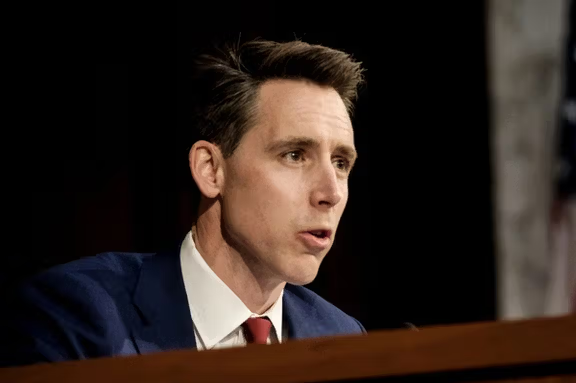
As United States Republicans campaign against Washington’s diplomacy with Iran, Senator Josh Hawley has launched a broadside against President Joe Biden.

As United States Republicans campaign against Washington’s diplomacy with Iran, Senator Josh Hawley has launched a broadside against President Joe Biden.
The Missouri Senator and close ally of former President Donald Trump told Iran International’s correspondent Tuesday that Biden’s ideas were “insane.” Hawley said the president was preparing to exempt Russia from Ukraine sanctions and to remove Iran’s Revolutionary Guards from the US list of ‘foreign terrorist organizations.’
Hawley, an opponent of the 2015 nuclear deal, which Iran and world powers are working to revive, said the US should not buy Iranian oil should sanctions be eased. “I think the idea that we would be getting energy from Iranians – even indirectly – is insane,” he said. “What the president needs to do is to open our own energy productions.”
About a provision in the new deal that would enable Russia to get billions of dollars for building reactors in Bushehr nuclear plant, Hawley said: “Oh gosh! It sounds awful. It couldn’t be worse. It just couldn’t possibly be worse.”
Hawley said that reapplying the 2015 deal, which Trump left in 2018 prompting an expansion in the Iran nuclear program, typified Biden’s approach: “With all due respect, the president is the guy who’s managed to lose two sovereign nations in six months: the Afghanistan debacle and Ukraine, and now he's out there trying to find ways to enable Iran.”
“What does he [Biden] want?” Hawley asked, adding, “What’s next? Is China gonna invade Taiwan? … Anyway this is crazy”.
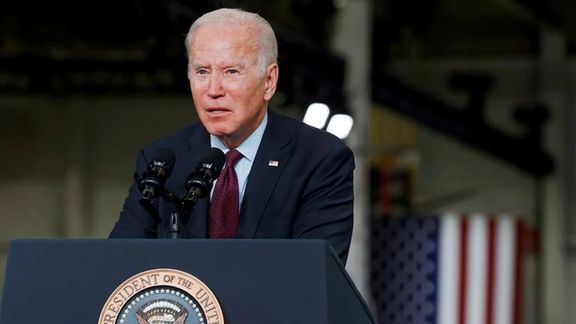
Pressure is growing on the Biden Administration to walk away from Vienna talks after reports that Iran's IRGC may be removed from the US terror designation.
Opponents of the restoration of the 2015 nuclear agreement, Joint Comprehensive Plan of Action (JCPOA), believe that restoring the JCPOA at the cost of delisting the IRGC without curbing Iran's ballistic missile program is too high a price for the United States to pay to bring Iran back to compliance with the deal.
In a statement Tuesday after a briefing with from the State Department’s main JCPOA negotiator Rob Malley, Senior Republican Senator Jim Risch called the reports out of Vienna "unsettling at best" and strongly criticized the Biden administration for pursuing a deal with Iran despite objections from US partners in the Middle East and urged the administration to walk away from the talks.
“A deal that provides $90-$130 billion in sanctions relief, relieves sanctions against Iran’s worst terror and human rights offenders, and delists the IRGC does not support our national security interests. Worse, this deal could enable Putin to continue to build out his nuclear arsenal and benefit financially in the midst of his assault against Ukraine. The administration should walk away,” he said in his statement.
Eighty-six Republican Representatives have signed a letter to Secretary of State Antony Blinken to express their opposition to the Biden administration's possible move to delist the IRGC. "We are united in strong opposition to any move to legitimize the IRGC's reckless, destabilizing, and anti-Semitic actions throughout the Middle East," the letter says.
"The President is the guy who’s managed to lose two sovereign nations in 6 months: The Afghanistan debacle and Ukraine, and now he's out there to find ways to enable Iran," Republican Senator Josh Hawley told Iran International correspondent in Washington on Tuesday.
Democratic Senator Tim Kaine, however, believes relations with Iran could become normal. "If we have arrangements [with Iran] that force us to communicate, we could expect trust to be rebuilt & eventually get to normalcy. There's nothing unrealistic about it: Japan & Germany are among our closest allies, but we were at war with them," he told Iran International.
The Senate Democratic Party whip Dick Durbin also cautiously defended the administration. He told Iran International’s correspondent Arash Aalaei on Monday that “the premise” of reviving the 2015 deal, the JCPOA (Joint Comprehensive Plan of Actions) was “sound to stop Iran from becoming a nuclear power.” This, Durbin said was “obviously in the best interests of regional and world peace.”
Answering a question about the concerns of other regional states, particularly Israel, which is believed to have nuclear weapons, Durbin reiterated that peace required “a credible, enforceable plan to stop Iran from developing nuclear weapons,” which he said would be a “threat to every nation in the region…including Israel.”
"The onus is on Tehran to make difficult decisions that it might consider difficult, but we have negotiated for the better part of a year – of course, indirectly through our allies and partners – in good faith in a constructive manner to get us to this point. We are still at a point where if those decisions are made, we could reach a mutual return to compliance very soon, but it will take some decisions," the State Department Spokesman Ned Price said at his daily briefing Tuesday.
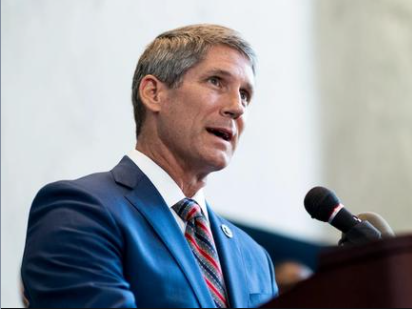
More Republican lawmakers have raised objections to removing Iran’s Revolutionary Guards (IRGC) from the US list of foreign terrorist organizations (FTO).
Representative Scott Franklin – who spearheaded a letter expressing opposition to the Biden administration’s possible move – reiterated on Tuesday that the IRGC is a chief sponsor of terrorism in the world today.
In the letter, Franklin and 86 of his colleagues urged Secretary of State Antony Blinken not to remove the IRGC from the list, saying the IRGC "is one of the most dangerous terrorist groups in the world today. Through its sponsorship of terrorism, the IRGC is responsible for the deaths of countless innocent people and at least 600 US troops during the occupation of Iraq”.
They said they are deeply concerned about reports that the administration intends to remove the IRGC terrorist designation “within the confines of a new Iran Nuclear Deal”, adding “We are united in strong opposition to any move to legitimize the IRGC’s reckless, destabilizing, and anti-Semitic actions throughout the Middle East”.
Israel’s prime minister and foreign minister have called on Washington to keep IRGC on the list, saying the IRGC is "a terrorist organization that has murdered thousands of people, including Americans”.
Iranian officials have been publicly raising the issue since at least November, saying a ‘good deal’ would mean lifting sanctions on the Revolutionary Guard.
Such a step would reverse former President Donald Trump's 2019 blacklisting of the group, the first time the US had formally labeled part of another sovereign government as a terrorist group.
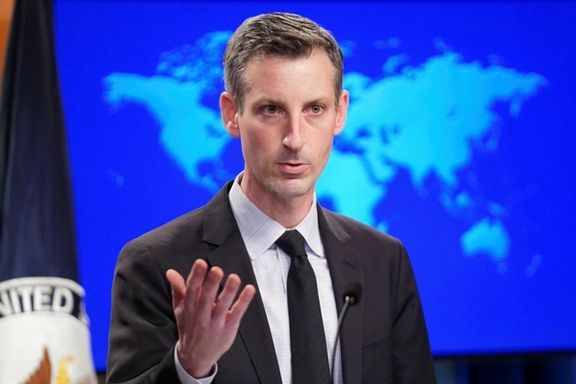
US State Department said on Tuesday that the onus is now on Iran on whether to enter into a mutual return to compliance with the 2015 nuclear deal, JCPOA.
Department spokesman Ned Price reiterated in his daily briefing on Friday that a return to the deal remained uncertain and was not imminent, despite optimism in recent weeks that indirect talks between Iran and the United States could soon produce an agreement. He made a similar statement on Monday saying a deal is not imminent.
The negotiation in Vienna that started more than 11 months ago have ended without a result, although all sides said only one or two issues remained to be agreed.
However, one major issue is Iran’s demand to remove its Revolutionary Guard from the US Foreign Terrorist Organization (FTO) list. The Biden Administration might have made an offer to Tehran in regard with the FTO listing and awaits a response.
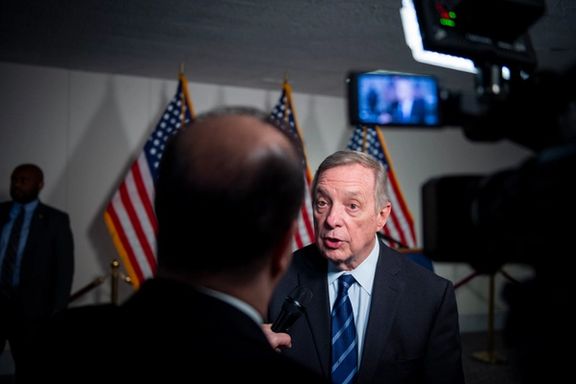
Democrats and Republicans agree on curbing Iran’s nuclear and ballistic missile programs, but they disagree over whether the 2015 nuclear deal should be revived.
The United States Senate Democratic Party whip Dick Durbin told Iran International’s correspondent Arash Aalaei on Monday that “the premise” of reviving the 2015 deal, the JCPOA (Joint Comprehensive Plan of Actions) was “sound to stop Iran from becoming a nuclear power.” This, Durbin said was “obviously in the best interests of regional and world peace.”
Durbin cited Russia as a nuclear-armed power. “We learned every single day in our calculations on Ukraine that the threat that Russia poses to the world with its nuclear weapons changes the equation,” he said.
Answering a question about the concerns of other regional states, particularly Israel, which is believed to have nuclear weapons, Durkan reiterated that peace required “a credible, enforceable plan to stop Iran from developing nuclear weapons,” which he said would be a “threat to every nation in the region…including Israel.”
Listing and Delisting
Many American and Israeli politicians oppose the JCPOA on the grounds that it does not require unilateral reductions in Iran’s ballistic missile capability Iran has developed for lack of an effective air-force. They also argue that restoring the JCPOA at the cost of removing the Iranian Revolutionary Guards (IRGC) from the US list of ‘foreign terrorist organization’ is too high a price.
Israel’s Prime Minister Naftali Bennett and Foreign Minister Yair Lapid recently called on Washington not to lift the designation, the only one of part of the armed forces of a sovereign state, even though a raft of other US sanctions would remain on the IRGC.
In response to another question by Iran International’s correspondent, Durbin said Iran had to prove that a restored JCPOA would not mean resources being available for the IRGC. “The Iranians have to forswear the terrorism that threatens the stability of many other countries too, and if they will do that and prove it with their conduct, I think there are chances we can move toward normalcy,” he claimed, without explaining what ‘normalcy’ might mean.
Republican senators remain steadfastly opposed to renewing the JCPOA, from which former president Donald Trump withdrew the US in 2018, imposing ‘maximum pressure’ sanctions. Republican Bill Hagerty, a close Trump ally, told Fox News Monday that “reviving the disastrous Iran nuclear deal” was “a vanity project for John Kerry [former Secretary of State) and [President] Joe Biden. They're putting America's strategic interests in the rearview mirror while doing anything they can to cut a deal with the largest state sponsor of terror.”
Yemen War
Opposing removing the IRGC from the list of ‘foreign terrorist organization,’ Hagerty argued that “we saw what happened when we took [Yemen’s] Houthis [Ansar Allah] off the list…they immediately went back to their terrorism.” The Biden administration delisted Ansar Allah in February 2021 in “recognition of the dire humanitarian situation in Yemen” following criticism from aid organizations.
The Wall Street Journal suggested Monday that efforts to revive the JCPOA, which have been going on for 11 months, hinge on the designation of the IRGC. US State Department spokesman Ned Price said Monday that “there has been significant progress in recent weeks, but I want to be clear that an agreement is neither imminent nor is it certain.”
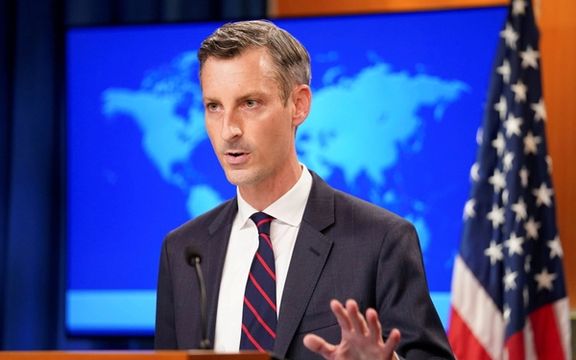
US State Department said Monday that a nuclear deal with Iran “is neither imminent nor is it certain”, as talks in Vienna have paused for more than ten days.
The department’s spokesman Ned Price in his daily briefing said, “there has been significant progress in recent weeks, but I want to be clear that an agreement is neither imminent nor is it certain.”
The statement came as National Security Advisor Jake Sullivan slammed Iran’s support for Yemen’s Houthis as the rebel force launched multiple attacks against Saudi Arabia over the weekend. Sullivan repeated US accusations that Tehran is supplying missiles and drones to the Houthis, violating a United Nations arms embargo.
It is clear that one major remaining issue in the Vienna talks is Iran’s demand to remove sanctions imposed by the Trump administration on the Revolutionary Guard, IRGC. Multiple reports have indicated the Biden Administration is weighing its options regarding the Iranian demand.
Opposition both in the United States and abroad has been strong against taking such a step. Both Republican and Democratic lawmakers have expressed concern over the possibility of removing the IRGC from the US Foreign Terrorist Organization (FTO) list.
Israel’s prime minister and foreign minister forcefully and publicly opposed the notion in a statement on March 18, while the United Arab Emirates is reportedly “shocked” at the notion.
The Jerusalem Post reported that some in Abu Dhabi “are in great shock,” and their views on the issue are similar to Israel’s.
Media reports have said that the Biden administration has an option to remove the FTO designation in exchange for a promise by Tehran not to use the IRGC and its proxy forces in the region to harm US interests. Both Israel and its Arab friends in the region view a possible reliance on Tehran’s promises as a naïve and dangerous notion.
It is not clear when and if the Vienna talks will resume. Price on Monday said he can offer no information and urged Tehran to free “innocent Americans and others” held in Iran, which is Washington’s “top priority.”
Both Saudi Arabia and the UAE have had difficulties in their dealings with Washington, which last year took steps distancing itself from Persian Gulf allies. The Biden team removed the Houthis from its terror designation and restricted weapons sales to the Saudi coalition fighting in Yemen.
Saudi Arabia and the UAE which had close relations with the Trump administration have not responded to Biden’s calls for more oil supplies in the wake of Russia’s invasion of Ukraine and have taken a neutral posture toward Moscow.
Price tired to minimize disagreements with the UAE when asked about the visit of Syrian president Bashar al Assad to the Emirates this week, which the administration has criticized.
Our Emirati partners, they are a partner of ours, and they will continue to be and are an important partner of the United States. We share a number of interests, including the security interests, our shared interest in bringing to a close this conflict in Yemen. We have a shared interest in terms of regional stability, in terms of pushing back on Iran, in terms of helping our Emirati partners defend themselves against the attacks that have emanated from Yemen, from the Houthis. And of course, we are committed to all of that,” the spokesman said.